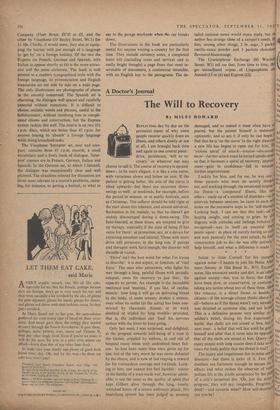A Doctor's Journal
The Will to Recovery
By MILES HOWARD
REFLECTING day by day on the perennial teaser of why some people recover quickly from an illness, and others slowly or not at all, I am brought back time and again to one central point : drive, persistence, 'will to re- covery,' or whatever one may choose to call it. The course of recovery is up-and- down : to be more elegant, it is like a sine curve, with variations above and below an axis. If the patient is getting better, the axis of the curve is tilted upwards—but there are recurrent down- swings as well : at weekends, for example, before the period in women, or at public festivals, such as Christmas. The sufferer should be told right at the start about this inherent, and almost universal, fluctuation in his malady, so that he doesn't get unduly discouraged during a down-swing. The faint-hearted, at these times, are tempted to give up therapy, especially if the state of being ill has value for them : as protection, say, or a device for attracting attention and interest. Those with more drive will persevere; in the long run, if patient and therapist work hard enough, the disorder will dwindle or vanish.
'Drive' isn't the best word for what I'm trying to describe : it is one aspect, or function, of 'vital force.' The man who perseveres, who fights his way through a long, painful illness with periodic relapses, owes his recovery to just that : the capacity to persist. An example is the incredible resilience and 'stamina,' if you like, of cardiac muscle: how long it will go on delivering blood to the body, at some seventy strokes a minute, even when its outlet (at the aorta) has been con- stricted by rheumatic disease, or its work doubled or tripled by lung trouble—provided, that is, the individual can 'feed' his nervous system with the force to keep going.
Only last week I was surprised, and delighted, at the progress towards well-being of a man in the forties, crippled by asthma, in and out of hospital many times with undoubted heart fail- ure: he had been more than once given up for lost, but at the very worst he was never defeated by the illness, and is now at last reaping a reward for his tremendous courage and fortitude. Look- ing at him, one cannot but feel humble : valour in the battles of a man-made war, however admir- able, is not the same as the quality of spirit that kept Gilbert alive through the long, lonely, wretched hours of a severe asthmatic attack. His heart-lung system has been judged as severely
ment—further attack must be turned upside-doviil so that it becomes a spiral of recovery; improve' meat—gain in confidence—fall in tension' further improvement.
Luckily for him, and for me, he was one those patients who went on quietly think0 out, and working through, the emotional origins his illness—a 'compound' illness, like rn others : made up of a number of disorders—in t intervals between sessions; he came to each Wit notes on the successive steps in his `self-thera0 Looking back, I can see that this task—of er larging insight, and coming to grips, by slat degrees, with attitudes and feelings hitherto of recognised—was in itself an essential the peutic agent : in place of merely having to sullt; and wait passively for the next attack, he had constructive job to do—he was able actively help himself, and what a difference it made Salute to John Connell for his camps against noise—I hasten to join his Noise AN( ment Society (6 Old Bond St., WI). Excessiv noise, like excessive smoke and dirt, is an &len against society—but, true to form, the De, have been slow, or conservative, or cautious,_; taking any action about any of these three. SO' like tobacco, is a direct threat to health, I citizens—if the average citizen thinks about it all—behave as if the threat wasn't very serious, if was directed at someone else, and not hill's° This is a defensive process very similar to elf soldier's belief, during his first experience battle, that shells are not aimed at him, but '1,it r)ot next man : a belief that will last until he gets.,1' c () himself and after that it turns into its opposit'l s that all the shells are aimed at him. Query—h°, pus many people with lung cancer does it take to e0 11,41
vince the body politic that the threat is real? poi;
The injury and impairment due to noise are lei fret dramatic—but there is more of it. Few 01 dwellers are fortunate enough to escape its I th''t effects and what strikes the observer of Me w politan life is the docile acceptance by the Otlu but of a city's perpetual din. 'Oh, just the price e, }ie4, progress,' they will say, resignedly. Progress. 11/ '‘ i- deed!—and towards what? How self-destrue r,
can you be? con,
damaged, and so indeed it must often have a peared, but the patient himself is stubborn]
optimistic, and so am I; if only he can begin I ,,
• 6 sant feel that he is 'on the move' in the right directio ,011 a new life has begun to open out for him. Pt so( 'vicious spiral' of attack—tension—discouraSt nut tln, grit Vit the dec ley
Wit the
41s;
the
Wei eye fro gra lOr Ito;
Wo
fail dev Sec f eri by
(or
or
of tioi
Af, roi! lens eon


































 Previous page
Previous page